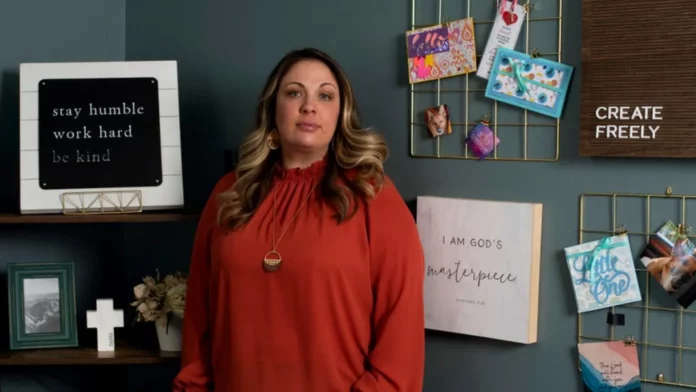Lorie Smith, the founder and owner of 303 Creative, who became a central figure in a landmark Supreme Court case defending free speech rights.
Insights from the Bench
A Big Win for First Amendment Advocates: Lorie Smith’s case against Colorado sets a critical precedent for protecting free speech in creative professions.
What This Means for You: Imagine being forced to promote a message that clashes with your deeply held beliefs. This case reinforces your right to say, “No.”
Navigating the Legal Landscape: The decision highlights the delicate balance between anti-discrimination protections and freedom of expression.
By Samuel A. Lopez – USA Herald
[DENVER, Colorado] – Seven years of courtroom clashes, public scrutiny, and personal threats ended in a resounding victory for Lorie Smith. The web designer, who operates 303 Creative out of Littleton, Colorado, made national headlines when the U.S. Supreme Court ruled in her favor earlier this year. The case wasn’t just about a website—it was about the right to speak freely without government compulsion.
Now, Smith will receive $1.5 million from Colorado to cover her attorney fees after the state’s Civil Rights Commission accused her of violating public accommodations laws by refusing to design a wedding website for a same-sex couple.
As someone who’s spent decades analyzing legal trends, I can’t overstate the implications of this case. It’s not just a victory for Smith— “it’s a win for anyone who values the First Amendment.” – Samuel A. Lopez
A Closer Look at the Case
Smith’s battle began in 2016 when she sought a preemptive ruling to exempt her from Colorado’s anti-discrimination law. The law requires businesses to serve all customers, regardless of sexual orientation, but Smith argued that creating a same-sex wedding website would violate her Christian beliefs.
“For me, it’s always about what message is requested, never the person making the request,” Smith said in ADF’s press release.
The Supreme Court’s 6-3 decision, delivered by Justice Neil Gorsuch, underscored this principle: “The First Amendment envisions the United States as a rich and complex place where all persons are free to think and speak as they wish, not as the government demands.”
But not everyone agreed. In a fiery dissent, Justice Sonia Sotomayor warned, “Today, the court, for the first time in its history, grants a business open to the public a constitutional right to refuse to serve members of a protected class.”
President Joe Biden also voiced his concerns: “In America, no person should face discrimination simply because of who they are or who they love.”
What This Means for You
This ruling carries significant implications beyond Smith’s case. Imagine you’re a graphic designer, a writer, or a filmmaker. Should you be legally compelled to create something that clashes with your personal values? The court’s decision makes it clear that the answer is no.
However, it’s essential to recognize the fine line here. Anti-discrimination laws remain vital in protecting individuals from systemic bias. This case doesn’t eliminate those protections—it reaffirms that the government cannot compel speech.
Smith’s case is part of a growing trend of legal battles at the crossroads of religious freedom and LGBTQ+ rights. In 2018, Colorado baker – Jack Phillips faced a similar controversy for refusing to design a cake for a same-sex wedding. He also prevailed with the Supreme Court.
Interestingly, questions have arisen about whether Smith ever received a genuine request to design a same-sex wedding website. Legal expert Katherine Franke from Columbia University explained that this detail is irrelevant in pre-enforcement cases. “What she was seeking is called a pre-enforcement order,” Franke noted, adding that the court’s decision stands regardless of the request’s authenticity.
The Road Ahead
This settlement—Reached on Tuesday—brings financial closure to a saga that captivated the nation.
As Americans, we must remain vigilant about protecting freedoms while ensuring that these rights are not weaponized to harm others. This case reminds us that legal victories often serve as roadmaps for navigating future conflicts.
In re 303 Creative LLC, et al. v. Elenis, et al., No. 1:16-cv-02372-PAB, U.S. District Court for the District of Colorado (2024)
At USA Herald, we’re committed to ethical reporting. This article has been fact-checked to ensure accuracy and fairness, providing you with factual, unbiased content. For more stories like this, explore my author bio or visit the USA Herald website.
Source link : http://www.bing.com/news/apiclick.aspx?ref=FexRss&aid=&tid=673edb5228614332bf0ee912c26f9b2b&url=https%3A%2F%2Fusaherald.com%2Fa-1-5m-victory-for-free-speech-colorado-pays-web-designer-after-supreme-court-win%2F&c=11337763784181601623&mkt=en-us
Author :
Publish date : 2024-11-20 12:53:00
Copyright for syndicated content belongs to the linked Source.
